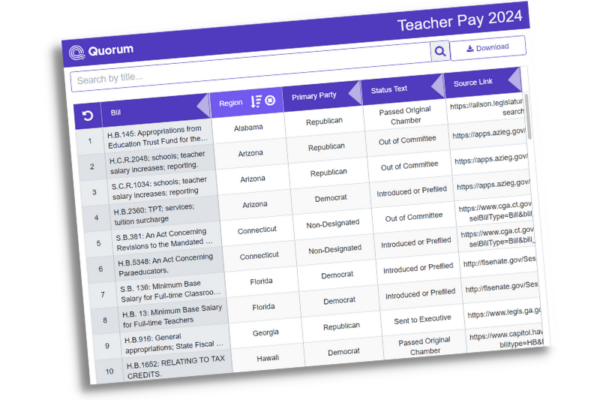Updated 5/27/2024
Teacher pay continues to draw significant attention in state capitols, as it has for the past few years. Last year, at least nine states increased educator compensation by changing salary structures, offering bonuses, or other means. This year, governors from both parties used their state-of-the-state addresses to urge their legislatures to raise educator pay and many have responded.
To date, FutureEd has identified 59 bills across 22 states in 2024 aimed at increasing teacher compensation. In some cases, the proposed legislation would increase pay for other public-school employees, too. Most of this year’s bills focus on raising teachers’ base pay, but some offer incentives, like salary bumps to retain experienced teachers or additional pay for teachers in high-need subjects and schools.
So far, nine bills have been enacted, taking various approaches to raising pay. South Dakota’s SB 127 establishes a minimum starting teacher salary of $45,000 for FY 2025 and requires annual increases after that, as well as annual increases in the state’s average teacher compensation. Perhaps most importantly, districts that fail to comply with these mandates could face a penalty of $500 for every teacher in the district. In Iowa, Republican Governor Kim Reynolds signed HF 2612, which raises the state’s minimum starting teacher salary to $47,500 in FY 2024 and $50,000 in FY 2025. Educators with at least 12 years of experience will receive a minimum salary of $60,000.
By contrast, Utah’s SB 173 pays for performance. The state’s new law establishes a five-year pilot program that provides $10,000 bonuses to the highest-performing 5 percent of Utah teachers, and $2,000 to $5,000 bonuses for the next-highest-performing 20 percent of teachers. Top-performing teachers at high-poverty schools will receive an additional salary supplement.
Elsewhere, legislation promises hefty raises to teachers’ base salaries. In Ohio, HB 411 would raise the base salary for teachers with a bachelor’s degree from $35,000 to $50,000, and for those with a master’s from $38,325 to $54,750. Connecticut’s SB 381 would set the minimum salary for teachers statewide at $60,000 starting in FY 2026 and would provide state subsidies to help local and regional boards of education meet the new minimum. Another Connecticut bill, HB 5348, would set $45,000 as the minimum salary for paraeducators.
Other states are exploring alternative ways to increase teachers’ overall compensation. To attract former public-school teachers into Oklahoma schools, HB 4017 would pay a $35,000 bonus to former teachers with at least three years of experience who have not worked in an Oklahoma public school for at least five years. The bonus would be paid in yearly installments of $7,000 for five years. Hawaii lawmakers have proposed monthly housing vouchers of up to $500 for qualifying teachers in HB 2515 and its companion bill, SB 2987. Another Hawaii bill, HB 1652, would give teachers an income tax credit to offset their personal purchases of classroom supplies.
We will continue to monitor and update the tracker as new bills are introduced and progress through the legislative process.


